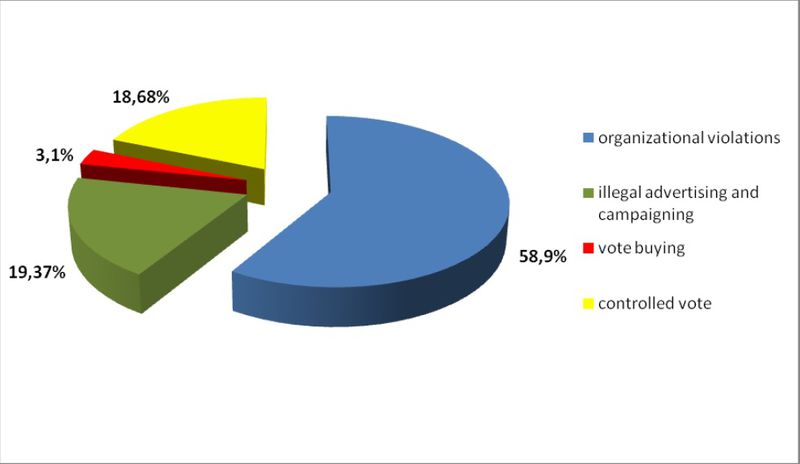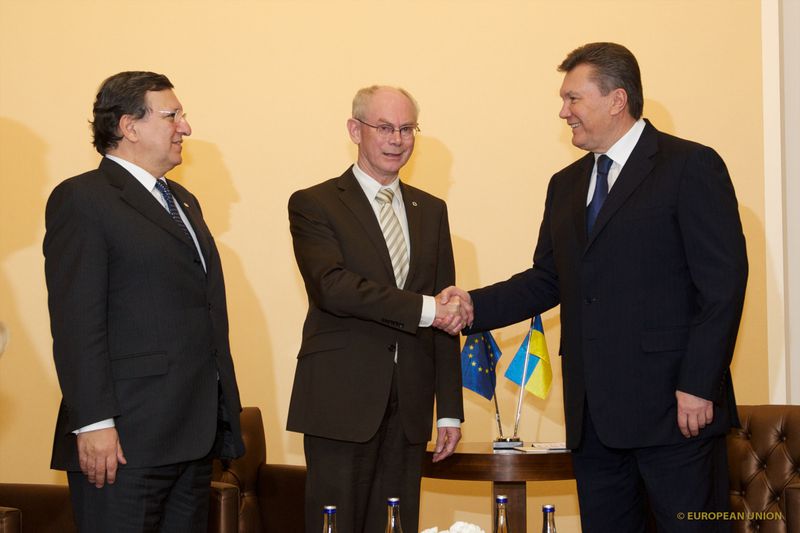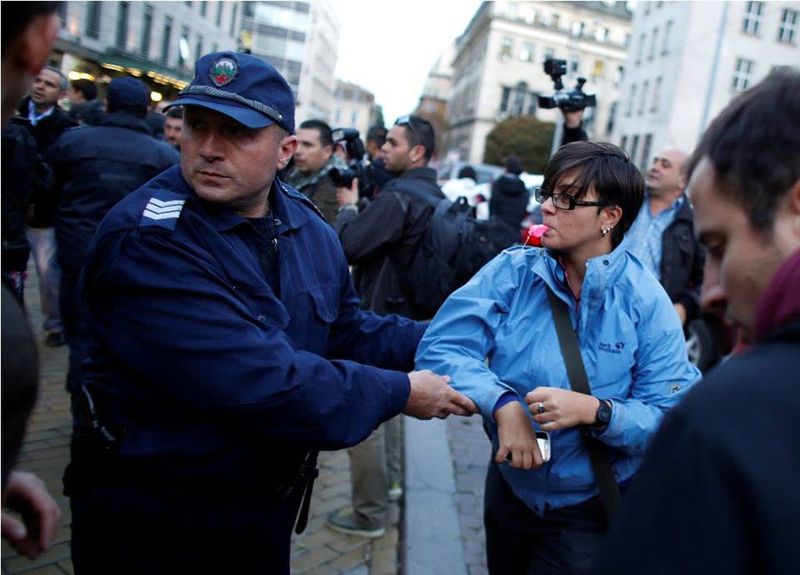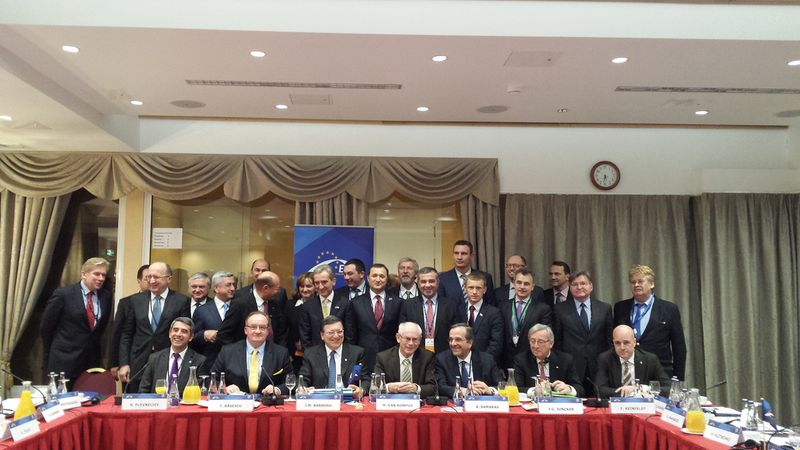A Shop-Made Democracy
Adelina Marini, July 23, 2013
 Is a shop-made democracy democracy? When 18.68% of the vote is controlled, 3.1% bought, when there is 19.37% illegal campaigning and advertising or when there are 58.9% organisational violations, according to Transparency International data about the early elections in Bulgaria on May 12th 2013? Is it democracy when there are paid protesters against the government, the president or something else? Is it democracy when in the electoral lists there are over a million of phantoms? Are ruling parties legitimate if they are elected by such a quantity controlled vote, bought votes, by organising voting excursions? Are legitimate parties which already fully undisturbed apply such practises? Is it admissible to have a shop-made democracy in the 21st century, the era of digital technologies, in a country member of the EU?
Is a shop-made democracy democracy? When 18.68% of the vote is controlled, 3.1% bought, when there is 19.37% illegal campaigning and advertising or when there are 58.9% organisational violations, according to Transparency International data about the early elections in Bulgaria on May 12th 2013? Is it democracy when there are paid protesters against the government, the president or something else? Is it democracy when in the electoral lists there are over a million of phantoms? Are ruling parties legitimate if they are elected by such a quantity controlled vote, bought votes, by organising voting excursions? Are legitimate parties which already fully undisturbed apply such practises? Is it admissible to have a shop-made democracy in the 21st century, the era of digital technologies, in a country member of the EU?
For 40 days in Sofia, but also in other cities in Bulgaria, tens of thousands of young people have been protesting, insisting on the resignation of the government and on new elections because the rulers managed, literally after their appointment, to prove that they work in the interest of certain economic circles. You will more and more often hear from people who give up the protests disgusted by heard stories of bought protesters or even witnesses of payments to stunt demonstrators. A friend of mine called me recently and told me a striking story about how around the protesting area, very openly, people are paying to stunts - 40 levs apiece (20 euros). Politicians from the ruling majority constantly say that the protest is illegitimate because it is "publicly known" that part of the protesters are bought.
The true protesters vs the shop-made ones
Tactics to discredit the most spontaneous supra party protest in the country's post-communist history or truth? An attempt to find an answer to this question made several mainstream media in the country. Yet in the very beginning of the protest, the Bulgarian National TV (BNT), with the help of hidden camera, revealed a repulsive scheme of implanting paid by the nationalist party ATAKA demonstrators in the main protest #ДАНСwithme with the only purpose the protest to be discredited and possibly quickly suppressed. The thousands of protesters, however, were quick to localise and isolate the clearly distinctive mercenaries who, against 30 levs (15 euros) and a pizza, provoked the police or the protesters themselves.
Then appeared speculations that many busses unloaded organised protesters from the countryside, of course claiming that the organiser is the biggest political rival. A thesis which also failed to remain long in the public domain without being exposed as false thanks to the 21st century - literally every protester is equipped if not with a professional camera, at least with a smart phone. In this way, no lie remained unexposed, but protesters began to endanger more and more the intertwined in dangerous oligarchic connections parliamentary parties trying in every possible way to break the creativity and innovation of the called "intelligent and beautiful" protesters, "insulted" also as "satiated" - in general, people who will hardly sell themselves even for a fifty per day.
But the mantra about the bought protesters continued on all media fronts. This is how another investigation by Nova TV happened which clearly showed that a company for stunts has developed a profitable business providing "demonstrators" to whom may need - without questions who is the buyer, why does he need protesters and what are his goals. The price is 25 levs apiece (less than 15 euros). In this way, the TV team succeeded to "buy" 10 protesters who looked "more ordinary" and they could even bring kids to make it harder to be distinguished by the vigilant eyes of the true protesters.
But as every shop-made thing, however, it has a price that corresponds to quality. As a rule, the true protesters not only readily seek and speak to media in order to distribute their cause as broadly as possible, which is in sharp contrast to the attempts of journalists to speak to the shop-made demonstrators. Usually, the otherwise actively shouting slogans against the president, but not against the government, men and women are hiding behind their placards or if they dare speak before media, they say what they are instructed to - we are not paid, we are here to protest against the president. Do you protest against the government? No, because the president is to blame. A thesis, broadly defended by the leading party in the ruling coalition - BSP. In fact, the goal is not only to turn the direction of the protest. It is visible that there is another goal - the protest to be discredited. The tag "bought", in spite of the ever more growing and contaminating practise of buying, brings strong negativism and causes disgust among citizens.
The Nova TV investigation also revealed how people from the circle of Volen Siderov, the nationalist leader, participate in the protests and while chanting slogans they do not stop talking on the phone. The reaction of the politicians usually is the same - you are paid, you participate in a conspiracy, this is a scheme. The investigative journalist with BNT Rossen Tsvetkov underscored that the schemes of buying of protesters is very similar to that of buying of votes. The same journalist made a large scale investigation of buying of voters for the presidential and local elections in Bulgaria in 2011. Then he managed to "sell" his vote against 60 levs (30 euros) in Nessebar. At some places, the price of a single vote reached 300 levs, as Mr Tsvetkov's investigation showed.
The buying of votes - a well known problem for the Commission
Although shopping of protesters is a relatively new approach, the trade with voters is already well developed in Bulgaria and according to the Commission, it has turned into practise. The Commission found out that there were such activities during the local elections in 2007 (the first year of Bulgaria's EU membership which was made possible thanks to the invention of the Cooperation and Verification Mechanism), but that the government undertook insignificant actions. It is already an established practise every political advertisement to be accompanied by an appeal that the buying and selling of votes is a crime, but nonetheless the data from the early elections this year, according to the independent observation mission of Transparency International, is 3 percent of the votes. Not less worrying is the size of the controlled vote and also of the number of phantoms - 1.3 million out of 6 956 890 people in the electoral lists.
All this only shows how big the stakes are for the true protesters who have to not only fight for the resignation of an undoubtedly failed cabinet that does not enjoy the confidence of a majority of citizens, but this threatens the huge efforts and self-sacrifice of protesters to go in vain in the next elections when the same parties that are now shopping with a dash protesters will be buying voters and also media time. The latter is very important.
According to the observation [in Bulgarian] of the Institute for Public Environment Development, the parties spent 52% of their money for election campaign for media. Most generous to media was a key for the entire transition party, one of the most non-transparent and controversial political parties in Bulgaria - MRF (controlling the Turkish minority) - which spent almost 4 million levs (2 mn euros), followed by its eternal coalition partner - Coalition for Bulgaria (BSP) - who spent for media advertisement 3.2 million levs. The winner in the elections - GERB - who, however, were incapable to form a government, handled the elections with less than 2 million levs for media advertisement. It is interesting to note also that the biggest share of the money went to private TV outlets - 45 per cent or 4.2 million levs. It is important, too, that 66 per cent of the incomes of the parties is budgetary subsidy, which means that an essential part of their expenses for media advertisement are paid by the taxpayers no matter what their political affiliations are.
Given the nature of the trade with voters, it is not clear what share of the money, therefore of the party subsidy, goes to buy votes or these days protesters. It is clear, though, that the Bulgarian citizens who rebelled against the lack of rule of law and values in politics, can no longer tolerate the shop-made democracy too. If now the immediate goal is to take the government down, the next very important task will be to destroy the shop-made democracy by slowly and with the help of digital technologies replace it with a true democracy, with true values and true politics. For now this sounds utopian. For how long?
 Entrance to the Berlaymont building | © EC - Audiovisual Service
Entrance to the Berlaymont building | © EC - Audiovisual Service | © European Union 2020, EC - Audiovisual Service
| © European Union 2020, EC - Audiovisual Service Commission President Ursula von der Leyen | © European Union 2019 - Source: EP
Commission President Ursula von der Leyen | © European Union 2019 - Source: EP Jose Manuel Barroso, Herman Van Rompuy, Viktor Yanukovych | © Council of the EU
Jose Manuel Barroso, Herman Van Rompuy, Viktor Yanukovych | © Council of the EU Magdalina Guenova | © Magdalina Guenova
Magdalina Guenova | © Magdalina Guenova | © EPP
| © EPP